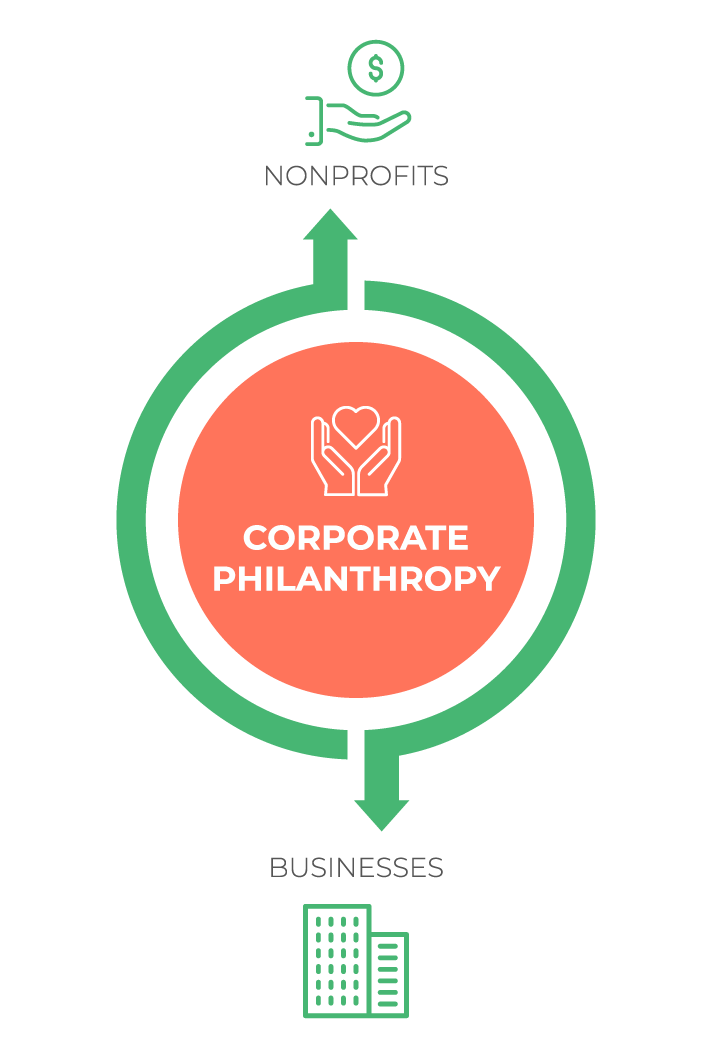Checking Out Just How Business Philanthropy Shapes Brand Name Reputation and Consumer Loyalty
Company philanthropy greatly influences brand credibility and consumer commitment. Business that take part in genuine philanthropic campaigns typically see a positive shift in exactly how customers regard them. This alignment of values fosters trust fund and emotional connections with target markets. The efficiency of these humanitarian efforts can vary considerably. Comprehending what genuinely resonates with consumers is necessary for brand names seeking to improve their social impact and market setting. What approaches will become crucial for future success?
The Evolution of Business Philanthropy
As services progressively recognize their function in society, the advancement of company philanthropy has actually transformed from mere philanthropic contributions to a tactical component of brand name identity. At first, business participated in philanthropy mainly for tax advantages or to improve their public photo. In time, this method shifted as stakeholders-- consisting of clients, workers, and investors-- required an extra authentic dedication to social obligation.
Organizations began straightening their kind efforts with their core values and organization goals, leading to more thoughtful and impactful contributions. This adjustment has actually motivated business to spend in sustainable methods and area development, cultivating a feeling of function that reverberates with consumers.
Technological innovations have actually facilitated transparency and involvement, enabling companies to display their humanitarian efforts extra properly. As a result, corporate philanthropy has become an important component of company method, with organizations embracing the opportunity to positively influence culture while enhancing their overall brand name story.
The Effect of Philanthropy on Brand Name Understanding
While business involve in philanthropic initiatives to promote social good, these campaigns considerably shape brand perception amongst customers. Company philanthropy can improve a brand's picture by linking it with positive social effect and neighborhood participation. Customers usually view brand names that proactively join charitable activities as even more trustworthy and liable. This understanding can affect purchasing choices, as customers might like brand names that demonstrate a commitment to social issues.

Structure Emotional Links With Granting
Company philanthropy works as a powerful device for boosting brand name identification by connecting corporate worths with community demands. Through strategic giving, companies can foster community engagement and create shared worths that reverberate with consumers on a psychological degree. This strategy not just reinforces brand name track record however additionally constructs long-term links in between services and their stakeholders.
Enhancing Brand Identity
They not only add to social great but additionally build deeper emotional connections with their target markets when business engage in philanthropic initiatives. By aligning their brand with philanthropic causes, firms improve their identification and signal worths that reverberate with customers. This placement develops a story that goes beyond solutions and products, welcoming consumers to get involved in a shared mission. As customers progressively focus on purpose-driven brands, companies that proactively participate in offering can distinguish themselves in a crowded market. Such campaigns promote a feeling of loyalty amongst clients who really feel personally linked to the brand's worths. Ultimately, business philanthropy becomes an important tool for boosting brand name identity, growing long lasting relationships based on common beliefs and emotional involvement.
Fostering Neighborhood Involvement
Various researches indicate that business participating in community-focused philanthropic initiatives can substantially strengthen psychological links with their stakeholders. By investing in neighborhood projects and sustaining social reasons, businesses grow a sense of belonging and count on within the area. This engagement promotes a favorable brand image, as clients value companies that demonstrate real concern for societal problems. Staff members often feel much more honored and determined to be associated with an organization that prioritizes community welfare. Consequently, consumers are more probable to develop loyalty towards brands that actively add to meaningful reasons. Ultimately, fostering community involvement via philanthropy not just boosts brand name online reputation yet likewise develops enduring emotional ties that benefit both the company and the community it offers.
Producing Shared Worths
Exactly how can services successfully produce shared worths that reverberate with their stakeholders? Business can attain this by straightening their humanitarian efforts with their core mission and the passions of their areas. By engaging in initiatives that address neighborhood requirements, companies foster psychological links with consumers, boosting brand name loyalty. For circumstances, partnering with non-profits that show shared values strengthens the brand name's image and shows commitment to social responsibility. In addition, transparent interaction regarding these initiatives enables stakeholders to see the tangible effect of their contributions. Eventually, by integrating common values right into their corporate philanthropy, business not only boost their online reputations yet likewise grow enduring relationships with clients, leading to enhanced commitment and trust. This positioning is important in modern-day consumer decision-making.
Situation Researches: Successful Philanthropic Campaigns
Taking a look at successful humanitarian projects exposes numerous strategies that improve brand name credibility. Impactful neighborhood campaigns, ingenious collaboration versions, and long-lasting involvement strategies have verified reliable in fostering positive connections with customers. These study highlight the relevance of thoughtful company giving up achieving both social and service purposes.
Impactful Area Initiatives
Many companies have effectively leveraged kind projects to boost their brand name reputation while making a significant effect in their neighborhoods. For circumstances, a modern technology company launched a digital literacy program in underserved neighborhoods, offering training and resources that equipped regional citizens. This initiative not just added to area growth yet additionally placed the business as a socially accountable leader. Similarly, a major food firm implemented a cravings alleviation project, partnering with regional nonprofits to distribute dishes to family members in demand. This effort strengthened community connections and cultivated consumer loyalty. With these impactful efforts, business have demonstrated their commitment to social obligation, efficiently straightening their brand values with the needs of the neighborhoods they offer, inevitably enhancing their overall online reputation.
Innovative Collaboration Models
The success of impactful neighborhood campaigns typically hinges on innovative partnership versions that bring with each other varied stakeholders to attend to complicated social challenges. Instance researches show how companies, non-profits, and federal government entities can team up effectively. An international corporation partnered with a regional non-profit to launch an education program, pooling resources and expertise to boost area literacy rates. Another example involved a tech company and a health care organization joining forces to develop a telemedicine solution for underserved populaces. These partnerships not only intensified the reach of humanitarian initiatives however likewise reinforced the brand names' online reputations by aligning their goals with community demands. Ultimately, ingenious partnership designs act as a catalyst for significant change and foster stronger links in between brands and their consumers.
Long-lasting Interaction Techniques

Gauging the ROI of Company Social Obligation
As firms increasingly invest in business social duty (CSR) efforts, recognizing the return on investment (ROI) related to these efforts comes to be necessary. Measuring ROI in CSR is multifaceted, usually incorporating both qualitative and measurable metrics. Monetary returns can be examined with boosted sales, boosted brand name loyalty, and boosted worker morale, which can bring about greater productivity. Furthermore, business may evaluate cost savings connected to lasting techniques, such as reduced waste or power usage.
Qualitatively, the influence of CSR on our website brand name track record can be assessed with customer understanding researches and social networks sentiment evaluation. Surveys can provide insights right into just how CSR activities influence customer loyalty and depend on. Benchmarking against industry standards can aid companies determine their CSR efficiency - corporate philanthropy. Ultimately, a thorough technique to gauging ROI enables companies to make enlightened choices about future CSR investments, lining up approaches with both monetary performance and social impact
Consumer Expectations and Company Duty
Progressively, consumers anticipate business to run with a solid feeling of business duty, seeing honest practices as a requirement for brand loyalty. This shift in assumption shows an expanding recognition of environmental and social concerns, leading clients to favor brands that line up with their values. Consumers are a lot more inclined to support companies that participate in clear methods, show sustainability, and contribute positively to their communities.
Social media magnifies these expectations, permitting customers to share their opinions and experiences quickly. Brands that fail to meet these moral criteria take the chance of reaction, while those that embrace corporate obligation commonly take pleasure in enhanced reputation and client loyalty. As customers demand responsibility, firms should integrate corporate social duty into their core approaches, prioritizing honest actions not equally as a marketing method, but as a fundamental element of their operations. This positioning can ultimately result in more powerful brand name fondness and sustained success in affordable markets.
Future Fads in Company Philanthropy and Brand Name Commitment
The landscape of business philanthropy is advancing, influenced by the heightened customer assumptions surrounding corporate obligation. Companies are significantly integrating social effect into their core organization strategies, not simply as a secondary task. Future patterns show a shift toward openness, with brand names sharing detailed info about their philanthropic campaigns and their straight effects on communities.
Innovation is playing an essential role, making it possible for real-time interaction in between brand names and customers. Social media site platforms facilitate straight interaction, permitting customers to articulate their expectations and hold brands accountable. In addition, more youthful generations, especially Millennials and Gen Z, prioritize sustainability and honest methods, driving businesses imp source to embrace more conscientious strategies.
As business philanthropy comes to be identified with brand name identification, firms that authentically straighten their objectives with social requirements are likely to foster more powerful consumer commitment. This convergence of values will ultimately form the future of corporate track record and customer partnerships in a progressively conscientious industry.
Regularly Asked Concerns
Exactly How Do Consumers Learn about a Firm's Philanthropic Initiatives?
Customers discover a company's humanitarian initiatives through different networks, including social networks, press releases, community occasions, and word-of-mouth. These methods facilitate awareness, allowing individuals to engage with brands that line up with their worths and interests.
What Function Does Staff Member Participation Play in Business Philanthropy?
Worker involvement in corporate philanthropy improves interaction, promotes a feeling of ownership, and reinforces group cohesion - corporate philanthropy. This participation typically magnifies the effect of philanthropic campaigns, resulting in higher understanding and assistance for the company's philanthropic efforts
Can Corporate Philanthropy Backfire on a Brand name's Credibility?
If viewed as insincere or opportunistic, business philanthropy can certainly backfire on a brand name's track record. Adverse public perception may develop, leading to lessened count on and loyalty among customers that prioritize authenticity in company activities.
Are Smaller Sized Business as Reliable in Philanthropy as Larger Corporations?
Smaller companies can be just as reliable in philanthropy as bigger companies, typically showing dexterity and authenticity. Their local efforts might reverberate much more deeply with areas, promoting authentic connections despite minimal resources compared to their larger counterparts.
Just How Can Business Select the Right Causes to Assistance?
Business can select the appropriate causes by straightening their worths with community requirements, evaluating stakeholder passions, and examining potential influence. This calculated method cultivates credibility, enhances involvement, and reinforces links with clients and the wider community.
While business involve in philanthropic efforts to promote social excellent, these initiatives greatly shape brand understanding among consumers. As customers increasingly prioritize purpose-driven brands, business that actively involve in providing can differentiate themselves in a congested market. Lots of companies have effectively leveraged kind projects to boost their brand online reputation while making a meaningful effect in their neighborhoods. Increasingly, customers expect firms to run with a strong sense of company obligation, watching honest methods as a requirement for brand loyalty. As company philanthropy ends up being associated with brand name identification, firms that authentically align their goals with societal needs are likely to cultivate stronger customer loyalty.